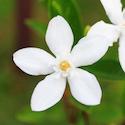Jasmine, with its fragrant blooms and lush green leaves, is a popular choice for gardens and landscaping. But in the midst of admiring its beauty, some gardeners have wondered, does jasmine attract snakes?
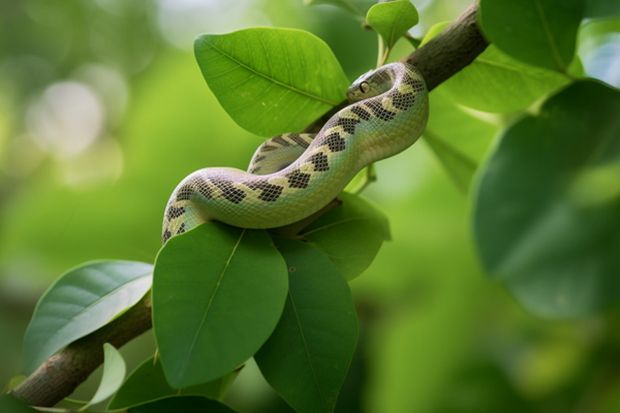
Jasmine plants do not inherently attract snakes. Snakes are typically drawn to areas with abundant prey, shelter, or warmth. While jasmine's dense foliage might offer some shelter, it is not a primary factor in attracting snakes. Keeping your property clean and well-maintained, with no piles of debris or food sources, can help reduce the likelihood of snakes appearing in your garden.
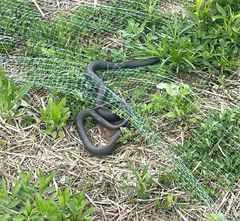
Snakes have a way of striking fear into the hearts of many, and the notion that jasmine might be a snake magnet has left more than a few gardeners on edge. However, before you jump to conclusions and start considering snake-charming as your next career move, let's take a closer look at the relationship between jasmine and snakes.
In this article, we'll delve into the world of jasmine and serpents to uncover the truth behind this intriguing garden myth. We'll examine the characteristics of jasmine plants, the habits of snakes, and whether there's any scientific merit to the idea that these beautiful flowers have a knack for attracting reptilian visitors. So, if you've ever pondered the connection between jasmine and snakes, stay with us as we separate fact from fiction in your garden.
Do fragrant plants attract snakes?
Now, let's address the pressing question: Do fragrant plants, like jasmine, have an irresistible allure for snakes? After all, it's not just jasmine that emits enticing scents; many other flowering plants produce fragrances that fill the air, making your garden a pleasant place to linger. Do these delightful smells also attracts unwanted snake visitors?
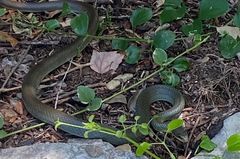
The short answer is no, fragrant plants are not snake magnets. Snakes are primarily guided by their instincts and needs, and they don't choose their habitats based on the scent of the plants around them. Instead, they seek out areas that provide essential resources such as food, shelter, and suitable temperatures.
Snakes are carnivores, and their main interest is finding prey, not enjoying the aroma of your garden. They're on the lookout for potential meals, such as rodents, insects, and other small creatures. So, while your fragrant flowers might attract pollinators like bees and butterflies, they won't suddenly turn your garden into a snake buffet.
Moreover, snakes are more interested in the physical environment of your garden than its olfactory delights. They'll seek out hiding spots like tall grass, shrubs, and rocks, where they can stay concealed and ambush prey. These hiding spots provide the safety and security that snakes require, and they're not chosen because of a pleasant fragrance.
In fact, fragrant plants can be beneficial to your garden by attracting pollinators and deterring certain pests. So, rather than worrying about whether your jasmine is inviting unwanted guests, you can enjoy its scent and the benefits it brings to your outdoor space.
That said, it's important to note that snakes may visit gardens for reasons unrelated to the plants. Factors like a nearby water source or a thriving population of their prey can be more influential in attracting snakes. Therefore, maintaining a well-kept garden with a focus on removing potential snake shelters and food sources is a more effective way to deter snakes if you're concerned about them in your area.
Snakes have their own agenda driven by survival instincts, and the fragrance of your garden won't make much of a difference in their choice of habitat. So, rest assured and enjoy the delightful scents and beauty that fragrant plants bring to your garden without worrying about an influx of slithery visitors.
Are snakes attracted to Jasmine smell?
Now, let's dive a bit deeper into the specific aroma of jasmine and whether it holds any snake-charming powers. Jasmine is renowned for its sweet and alluring fragrance, which can fill the air and create a captivating ambiance in your garden. But does this enchanting scent have a magnetic effect on snakes?
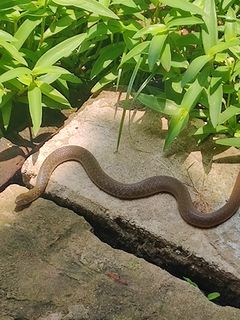
The answer is a resounding no. Snakes do not have a preference for the scent of jasmine or any other flower, for that matter. Their olfactory system is tuned to detect scents associated with their primary needs: finding food, identifying mates, and navigating their environment.
Jasmine's delightful scent is primarily designed to attract pollinators like bees and butterflies, which are drawn to the nectar-rich blooms. These tiny insects are not on the snake menu, so there's no reason for snakes to be enticed by the sweet smell of jasmine.
Snakes rely on their keen sense of smell to locate prey, using their forked tongues to gather scent particles from the air and ground.
Their prey typically emits specific chemical cues, such as the scent of rodents or birds, which snakes are highly attuned to. The fragrance of flowers like jasmine doesn't contain these cues, making it irrelevant to snakes in terms of hunting.
In essence, while we humans find the scent of jasmine captivating and delightful, it's merely a pleasant background note in the sensory world of snakes. Snakes are more interested in the scent trails left behind by potential meals or the pheromones emitted by other snakes during breeding season.
So, if you have a thriving jasmine plant in your garden, you can relish its enchanting aroma without worrying that it will turn your outdoor space into a snake haven. Snakes are not swayed by the scent of jasmine, and your garden's fragrant atmosphere is more likely to attract beneficial pollinators than unwanted reptilian visitors.
In the end, while the smell of jasmine might be irresistible to us, it's just another pleasant aspect of your garden for snakes – not a snake-summoning spell.
Do snakes like star jasmine?
Star jasmine, scientifically known as Trachelospermum jasminoides, is another popular garden favorite renowned for its fragrant, star-shaped white flowers and glossy green leaves. As we've discussed, snakes are not particularly drawn to the scent of flowers in general, but what about star jasmine specifically?
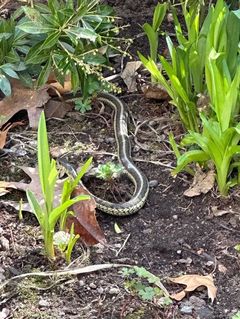
The good news for gardeners who adore star jasmine is that there's no evidence to suggest that snakes have a particular affinity for this plant. Like other fragrant flowers, star jasmine primarily attracts pollinators, such as bees and butterflies, with its sweet aroma. Snakes, on the other hand, are more focused on finding prey and suitable hiding spots.
Star jasmine's lush, dense foliage can provide hiding places for small creatures like rodents or insects, which could potentially attract snakes looking for a meal. However, this is more of an indirect association rather than snakes being attracted to star jasmine itself.
It's important to remember that snakes are opportunistic hunters and will go where they can find food and shelter. If your garden has conditions that are favourable for the snake's natural prey, such as mice or insects, it might inadvertently attract snakes. But this has little to do with the presence of star jasmine or its fragrance.
To minimise the likelihood of snakes taking up residence in your garden, focus on removing potential snake shelters like piles of debris, tall grass, or dense vegetation where they could hide. Additionally, consider measures to control the populations of the snake's prey, such as rodents, as this can indirectly reduce the attractiveness of your garden to snakes.
Snakes are more concerned with their survival needs, and the presence of star jasmine in your garden is unlikely to make it a snake hotspot. So, feel free to enjoy the beauty and fragrance of star jasmine without worrying about it being a snake magnet.
Cestrum Nocturnum attracts snakes?
Cestrum nocturnum, commonly known as night-blooming jasmine or queen of the night, is a unique plant known for its fragrant, star-shaped, white flowers that bloom at night, filling the air with a sweet and intoxicating scent. Given its name and its nocturnal blooms, some gardeners might wonder if Cestrum nocturnum has any particular allure for snakes.
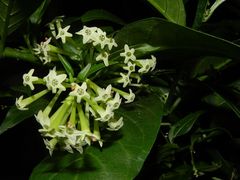
Let's clear the air: Cestrum nocturnum, like other fragrant plants, is not a specific attraction for snakes. Snakes, as we've discussed, are primarily motivated by finding food, shelter, and suitable environmental conditions. They don't possess a preference for the scent of particular flowers.
The sweet fragrance of night-blooming jasmine, while delightful to our senses, is primarily intended to attract night-flying pollinators like moths and certain species of bats. These are not the prey items that snakes typically seek out.
In fact, Cestrum nocturnum is more likely to attract beneficial insects like moths, which can be part of a balanced ecosystem in your garden by aiding in pollination. These insects do not typically pose a threat to humans and are not a source of attraction for snakes.
Snakes, if they visit your garden, are more likely to do so for other reasons, such as seeking shelter, hunting for small mammals or insects, or even following a potential mate's scent trail during breeding season. The presence of Cestrum nocturnum is not a primary factor in their decision to visit.
To reduce the likelihood of snakes making your garden their home, focus on general snake prevention measures such as maintaining a well-kept yard, removing potential hiding spots, and ensuring there are no easy food sources for them. These actions are more effective in deterring snakes than worrying about the fragrant beauty of night-blooming jasmine.
Snakes have their own reasons for visiting outdoor spaces, and the presence of this fragrant plant is not a significant factor in their choice of habitat. So, enjoy the enchanting scent of night-blooming jasmine without concerns about inviting snakes into your garden.
Final thoughts
In the garden of life, fragrant plants like jasmine, star jasmine, and night-blooming jasmine are the maestros, conducting symphonies of scent that captivate our senses. But, rest assured, these delightful blooms are not orchestrating snake invasions. Snakes, while fascinating and sometimes feared, aren't swayed by the aromatic allure of these plants.
Your fragrant garden treasures serve a higher purpose: attracting pollinators and enhancing the beauty of your outdoor space. Bees, butterflies, and other beneficial insects are the real guests of honor. They're drawn by the sweet perfumes, not to mention the nectar, and they play vital roles in the ecological tapestry of your garden.
When it comes to snakes, their presence in your garden is more likely due to factors unrelated to the fragrant blooms. It might be shelter, access to prey, or breeding opportunities. By focusing on general snake prevention measures—such as tidying up your yard and minimising potential hiding spots—you can create a less inviting habitat for these reptiles.
